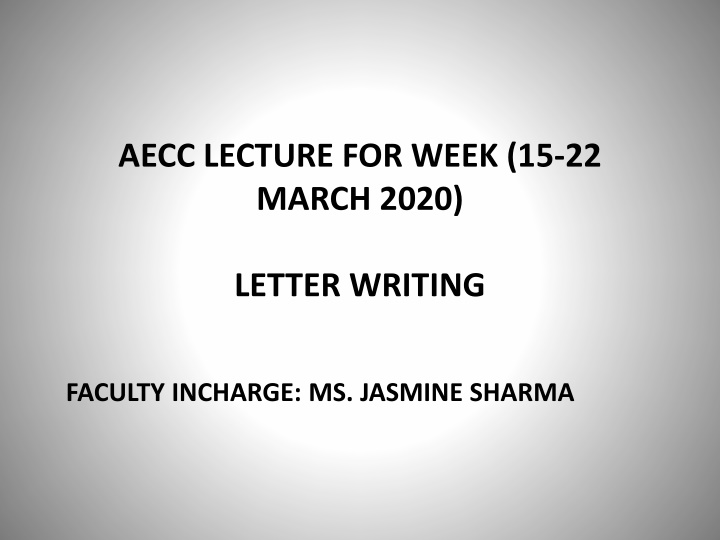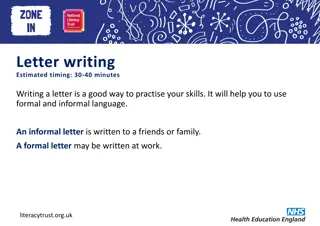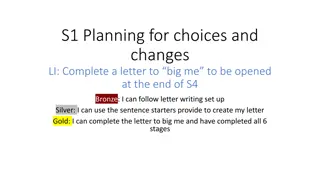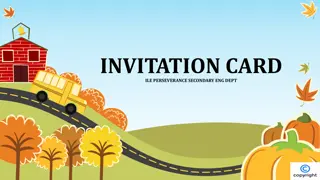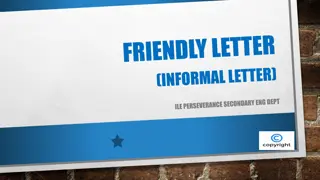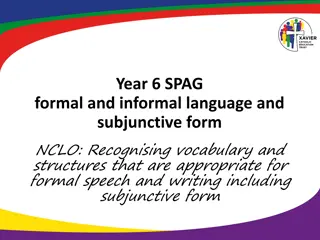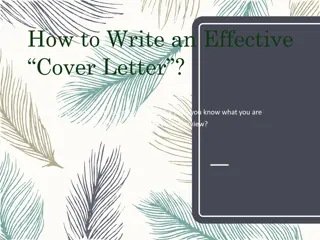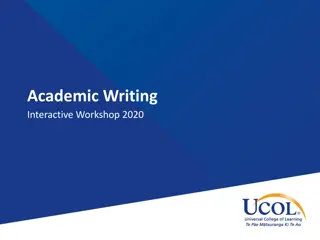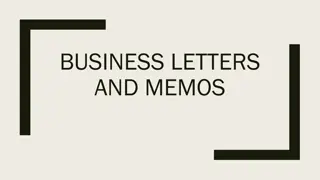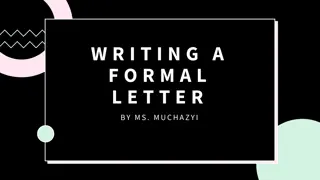Formal Letter Writing Essentials
Discover the key elements of formal letter writing, including format, structure, and content. Explore the importance of clarity and formality in communicating through letters. Gain insights into crafting effective introductions, detailed body content, and impactful conclusions. Enhance your letter writing skills for various communication purposes.
Download Presentation

Please find below an Image/Link to download the presentation.
The content on the website is provided AS IS for your information and personal use only. It may not be sold, licensed, or shared on other websites without obtaining consent from the author.If you encounter any issues during the download, it is possible that the publisher has removed the file from their server.
You are allowed to download the files provided on this website for personal or commercial use, subject to the condition that they are used lawfully. All files are the property of their respective owners.
The content on the website is provided AS IS for your information and personal use only. It may not be sold, licensed, or shared on other websites without obtaining consent from the author.
E N D
Presentation Transcript
AECC LECTURE FOR WEEK (15-22 MARCH 2020) LETTER WRITING FACULTY INCHARGE: MS. JASMINE SHARMA
LETTER WRITING Letters as a means of written communication. An important means of seeking formal and informal information between the sender and the receiver. An important means of self-expression to enrich personal and professional relationships. Letters can be classified into two types: 1. Informal Letters 2. Formal Letters The lecture focuses on formal letters. Different types of formal letters and their writing styles will be discussed in the next lecture.
FORMAL LETTERS Formal letters are used for communication among students and faculties, employees and employers, business delegates or between individuals seeking formal request or consent. Formal letters follow a particular structural format and style in order to maintain clarity and formality of the situation. The fundamental components of a formal letter are outlined in the next slide.
FORMAT FOR FORMAL LETTERS House no. 123, ABC Road, PQR CITY: Pin code Writer s address 20 March 2020 (not 20/03/2020) Date Name of school/office/company etc, EFG Road, XYZ City: Pin Code Receiver s address Dear sir/ Madam, Salutation
FORMAT CONTINUED... Subject Line: Write the theme (the basic question/concern of the letter) Body of the letter Divided into three parts: 1. Introduction 2. Main Content 3. Conclusion Yours sincerely/faithfully (Signature) Name Signatures Note: Faithfully is used in case of dear sir/madam while sincerely is used in case of Dear Mr./Ms./Dr. Name of the Person)
INTRODUCTION The introduction part of the letter outlines the subject line that is the purpose of writing the letter. It usually begins with lines such as: This letter is to draw your kind attention towards... This is to inform you that... On behalf of... This is with reference to... This part of the letter should contain around 30-40 words
BODY The body of a formal letter discusses the subject outlined in the introduction in detail. It tries to answer the WH questions (Where/What/When/Why/ How etc. )and provides maximum information about the concerned subject. For the purpose of clarity, the body can be sub- divided into different parts (depending on the information to be provided in the letter). The body should contain around 60-70 words.
CONCLUSION The Conclusion should give a complimentary closure to the entire letter. It should end with a vote of thanks and regards in order to form a good association with the recipient. The conclusion should contain around 20-30 words. The entire letter should contain around 100-120 words.
SAMPLE QUESTIONS 1. You are Ankit/Ankita, a student residing in Sabarmati Hostel, University of Delhi. Write a letter to your college warden discussing the issue of hygiene in your hostel. 2. You are Mohan/Monika, a resident of Defence Colony, New Delhi. Write a letter to your Municiple Commissioner discussing the lack of police patrolling in your area.
